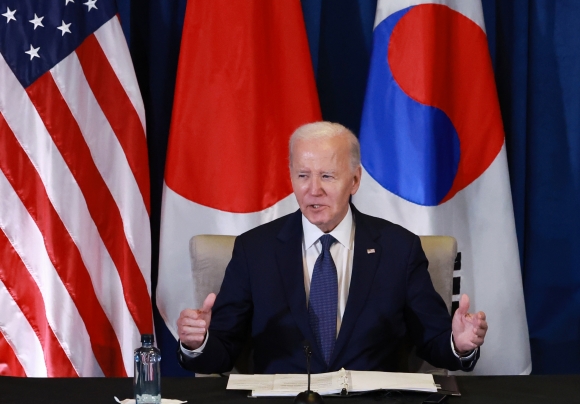Allocated $39 billion to US investment firms, Concerns over Trump’s withdrawal of semiconductor law
US Commerce Department working through the weekend
Samsung expected to receive $6.4 billion and SK $450 million
“Aim to fully spend the R&D funds”,

US President Joe Biden speaks at the Korea-US-Japan summit held at the Lima Convention Center in Peru on the 15th (local time). 2024.11.16 Yonhap News,
,
, ‘The Joe Biden administration of the United States is rushing to distribute subsidies under the Semiconductor Support Act (CHIPS Act) about two months before the transfer of power to President-elect Donald Trump. Bloomberg News and the Wall Street Journal (WSJ) reported on the 20th (local time) that the Biden administration is expediting follow-up negotiations to ensure that allocated subsidies can be paid out to companies before the new administration takes over.’,
,
, ‘Previously, the US Department of Commerce allocated most of the $39 billion (approximately 54.5 trillion won) in subsidies, as stipulated by the Semiconductor Act, to global companies investing in the US in 2022. However, about $30 billion (42 trillion won) of this remains unpaid as the government negotiation process is incomplete, with only preliminary agreements made.’,
,
, ‘MobileAdNew center’, ‘So far, subsidies have been announced for $8.5 billion to Intel, $6.6 billion to TSMC, the largest foundry company in the world, $6.4 billion to Samsung Electronics, and $450 million to SK Hynix, among others such as Microchip Technology, GlobalFoundries, and the UK-based BAE Systems.’,
,
, ‘Commerce Secretary Gina Raimondo told Politico in an interview that “the goal is to fully spend all research and development (R&D) funds before we leave,” adding that they want to complete significant announcements related to cutting-edge technology-leading companies. “We are an agency more focused on national security than ever,” she emphasized, “Security includes not just tanks and missiles but also semiconductors and artificial intelligence (AI).”‘,
,
, ‘The Biden administration has expedited its actions because President-elect Trump is skeptical of Biden’s policies, including the Semiconductor Act and the Inflation Reduction Act (IRA). President-elect Trump has criticized the Semiconductor Act during the election campaign as “a very bad deal” and advocated for imposing tariffs on imported semiconductors instead of granting subsidies to encourage foreign companies to build manufacturing plants in the United States.’,
,
, ‘To accelerate negotiations, Secretary Raimondo instructed her staff to work on weekends and personally called the CEOs of involved companies. As a result, TSMC’s Arizona plant was the first to have its subsidy confirmed among these companies. Samsung Electronics and SK Hynix are also expected to start negotiations soon.’,
,
, ‘MobileAdNew center’, ‘Secretary Raimondo stated that “January 20, when the next administration is inaugurated, is clearly the deadline,” but said she does not excessively worry about the withdrawal of the Semiconductor Act’s subsidy provisions. Experts interpret that once the subsidies are paid, they carry legal binding power, and it would be impossible to reverse them without congressional approval.’,
,
, ‘Particularly, the Semiconductor Act passed with bipartisan support, and many of the companies that benefit from the subsidies are located in constituencies represented by Republican governors and legislators in Texas, Arizona, and Indiana, who would likely oppose the cancellation of the subsidies. Industry insiders who have discussed with Trump’s team predict that the Semiconductor Act will likely survive the change in administration, according to the WSJ.\n’]

